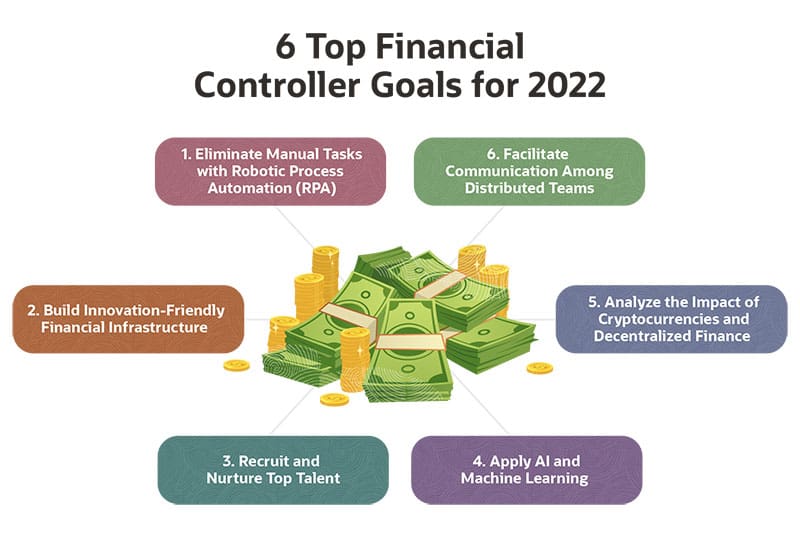As the head of an organization’s accounting team, the financial controller plays an increasingly strategic role in making sure the company runs smoothly. There are many opportunities for controllers to improve the efficiency of day-to-day financial operations and enhance the business overall. New technologies help companies streamline or eliminate manual tasks and create more accurate financial forecasts, for example. At the same time, controllers face the challenge of hiring and retaining talent that can help the company take advantage of these technologies to transform the business. Here are six top goals for financial controllers in 2022.
What Is a Financial Controller?
A financial controller — sometimes called a “comptroller” — is a senior member of a company’s financial leadership team. The financial controller heads the organization’s accounting function and manages day-to-day financial operations.
Beyond those duties, the controller’s role varies, depending on the size and complexity of the business. In smaller companies, the controller and CFO may be the same person. As companies grow, mounting business complexity often requires these roles to be divided, with the CFO spending more time on strategy, while the financial controller focuses on day-to-day operations. In practice, at many organizations, the financial controller is part accountant, part CFO and part compliance officer. Financial controllers must be unassailably ethical, because any ethical blemish could cast doubt on the company’s finances.
Financial controllers have a wide variety of responsibilities, including:
- Managing and streamlining accounting operations, including the financial close.
- Preparing financial reports and analyzing financial data.
- Participating in the budgeting process.
- Developing plans for financial growth.
- Evaluating and managing risk and financial compliance.
6 Financial Controller Goals to Crush in 2022
Controllers have many opportunities to enhance the company’s finance and accounting functions in 2022. They include applying technologies, such as robotic process automation (RPA) and machine learning, to streamline accounting and deliver improved data analysis, as well as ensuring that the company has technology in place to support innovative new services. Equally important for many companies will be hiring the right talent and managing a distributed finance team.

-
Eliminate Manual Tasks with Robotic Process Automation (RPA)
There is an enormous opportunity to streamline business processes using automation. In accounting and finance, nearly 90% of activities can potentially be automated, according to finance leaders surveyed by Gartner. One example of an area to focus on: accounting staff who often have to manually clean and combine data from multiple systems before the information can be analyzed, which is not only time-consuming but also ripe for the possibility of human error.
Robotic process automation (RPA) is easy-to-program software that enables companies to automate basic, repeatable and sometimes tedious tasks. RPA can help companies:
- Shift staff from transactional, repeatable work to more mission-critical work.
- Increase accuracy and productivity by eliminating or reducing manual activities.
- Reduce staff costs.
-
Build Innovation-Friendly Financial Infrastructure
Many companies are accelerating their digital transformation to remain competitive and add innovative services as they respond to challenging business conditions and new market entrants. A critical aspect of the financial controller’s role is ensuring that finance systems are prepared for these challenges, including support for new services.
One real-world example is the restaurant industry’s rapid, large-scale adoption of off-premises dining through online systems and third-party delivery services. What was previously a loose process involving phone calls and manual order entry has evolved into fully integrated online ordering, allowing restaurants to expand the number of customers they can serve each day. As a result, off-premises dining has become a potent revenue stream: Revenue from online food delivery in the U.S. is expected to reach more than $32 billion by 2024, according to Statista.
Financial controllers are central to making sure the company’s finance systems and processes will be capable of rapidly supporting new services, such as the one described above, by planning automatic and accurate accounting for transactions and providing financial reporting. Business software application suites that integrate financial management with other functions, including ecommerce and inventory management, can help businesses adapt rapidly.
-
Recruit and Nurture Top Talent
The finance team’s evolving role in the business means it’s more critical than ever for financial controllers to make sure they have the right people on staff. While some skills can be added by training existing staff, it may also be necessary to recruit new talent in order to build a culture that enables the company’s digital transformation — and it can be challenging to find candidates with in-demand digital skills in technologies such as RPA.
Among the key skills financial controllers need to incorporate into their teams, according to the American Institute of CPAs, are:
- An understanding of transformative technology. A grasp of this important skill will help the company take advantage of all types of transformative technology within the business, from ecommerce to RPA and AI.
- Data analysis and presentation. As routine tasks become automated, finance specialists can spend more time analyzing the data and applying those insights to the business’s goals.
- Communication. Along with the ability to analyze data, finance specialists should be prepared to share their insights with other people across the organization. Key skills to achieve this include the ability to turn data sets into compelling stories, to communicate these stories to others, to apply critical thinking and to ask the right questions.
- Agility and willingness to learn. New technologies will require a talent for reimagining current processes — and a financial staff that is flexible and willing to learn new procedures.
-
Apply AI and Machine Learning
AI and machine learning are powerful technologies that can be applied to many aspects of the business, not just finance. These technologies are advancing rapidly, and it’s imperative for financial controllers to understand where they can have the biggest impact. Increasingly, AI and machine learning are being built into business applications, making them available to businesses of all sizes. Areas where AI and machine learning can be applied to finance include:
- Transforming unstructured data, from paper-based and electronic invoices, purchase orders and contracts, into machine-readable structured data to eliminate manual effort and improve accuracy.
- Financial forecasting. Machine learning makes it possible to analyze enormous amounts of information, including data from external sources, to create more accurate financial forecasts. For example, companies can improve forecasts by analyzing a combination of regional market data and historical sales information, together with stock availability and weather data. The finance team might also analyze customer payment history to improve cash-flow projections.
- Identifying trends and risks. Machine learning can sift through volumes of market research, news reports and other data to discover trends that may impact the business.
-
Analyze the Impact of Cryptocurrencies and Decentralized Finance
While cryptocurrency is far from ubiquitous, thousands of companies now accept cryptocurrencies as payment or invest in them. It’s becoming increasingly important for financial controllers to understand how to account for cryptocurrency holdings and transactions, as well as their impact on taxes. They may also need to make sure the company’s systems can track and report the value of cryptocurrency transactions and investments. Important considerations include:
- Establishing a strategy for recognizing transactions and capturing transaction-level detail.
- Incorporating documentation and processes to mitigate tax exposure.
- Recording gain or loss in value when cryptocurrency is spent.
- Measuring and reporting volatility in cryptocurrency value.
A related early-stage development to watch is the emergence of decentralized finance (DeFi), which applies the blockchain technology underlying cryptocurrencies to create new financial services that rely less on traditional intermediaries, such as banks. Planned and existing services include lending, trading and smart contracts that execute automatically when predetermined conditions are met.
-
Facilitate Communication Among Distributed Teams
The rise of the remote workforce means financial controllers need to emphasize facilitating communication across distributed finance teams — particularly since nearly three out of four CFOs plan to shift at least some staff offsite, according to Gartner. For remote workers, many of the intangible aspects of communication — such as body language and hallway conversations — are either invisible or unavailable. Ensuring that the finance team has the right communication tools — and uses them in the right way — can help team members work together efficiently.
- Videoconferencing tools and phone calls enable synchronous communication among team members. This is useful for meetings, one-on-one communications and other situations where real-time feedback and input is important to align participants on issues and goals — such as discussion of new projects or initiatives.
- Email and texts are useful where immediate response to communications is not necessary — for example, when documents need to be distributed for reading before a meeting.
- Cloud-based applications make it easier for employees to work from anywhere with real-time access to current information. These apps include not only cloud financial management and ERP applications, but also online file repositories for shared documents and project management tools.
Conclusion
Financial controllers have many opportunities to play ever more strategic roles in the business while increasing accounting efficiency. Among the possible opportunities are applying technology to automate manual tasks, enabling more accurate analysis and forecasts and supporting new business services with accounting software.
Financial Controller Goals FAQs
What are the 5 significant roles of a financial controller?
Financial controllers have a wide variety of financial duties. Five key responsibilities are managing accounting functions and operations, including the financial close; analyzing financial data; producing financial reports; contributing to the budgeting process; and managing financial risk and compliance.
How can I be a good financial controller?
To be successful, focus on transformational technologies and automate mundane transactional tasks. Increasing efficiency is an important aspect of the financial controller’s job. Replacing spreadsheets with accounting software that automates manual processes can streamline operations, as can using robotic process automation to import data from multiple systems. The time saved can be applied to strategic analysis that supports business goals.
What are the skills of a financial controller?
A financial controller should have a broad skill set. A good knowledge of accounting and finance is foundational. It’s also vitally important to stay up to date with changing financial regulations. As the leader of the accounting function, a financial controller can be under a lot of pressure, so handling deadlines and accurate planning are also important. In addition, the financial controller must be skilled in managing a team and communicating with other senior managers within the organization.









